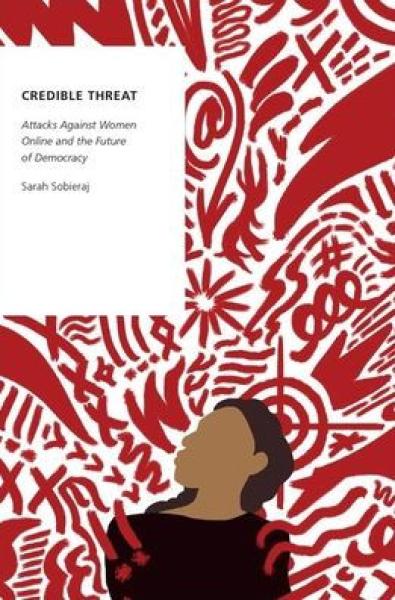Description
Sarah Sobieraj shows that this online abuse is more than interpersonal bullying--it is a visceral response to the threat of equality in digital conversations and arenas that men would prefer to control. Thus identity-based attacks are particularly severe for those women who are seen as most out of line, such as those from racial, ethnic, and religious minority groups or who work in domains dominated by men, such as gaming, technology, politics, and sports. Feminists and women who don't conform to traditional gender norms are also frequently targeted.
Drawing on interviews with over fifty women who have been on the receiving end of identity-based abuse online, Credible Threat explains why all of us should be concerned about the hostile climate women navigate online. This toxicity comes with economic, professional, and psychological costs for those targeted, but it also exacts societal-level costs that are rarely recognized: it erodes our civil liberties, diminishes our public discourse, thins the knowledge available to inform policy and electoral decision-making, and teaches all women that activism and public service are unappealing, high-risk endeavors to be avoided. Sobieraj traces these underexplored effects, showing that when identity-based attacks succeed in constraining women's use of digital publics, there are democratic consequences that cannot be ignored.
"This book argues that the rampant hate-filled attacks against women online come are best understood as patterned resistance to women's political voice and visibility that coalesce into an often-unrecognized form of gender inequality that constrains women's use of digital public spaces, much as the pervasive threat of sexual intimidation and violence constrain women's freedom and comfort in physical public spaces. What's more, the abuse exacerbates inequality among women, as women of color, and Muslim, immigrant, and/or LBTQ women of all races, are disproportionately targeted. Drawing on in-depth interviews with women who have been on the receiving end of digital hate, Credible Threat shows that the onslaught of epithets and stereotypes, rape threats, and commentary about their physical appearance and sexual behavior come with great professional, personal, and psychological costs for the women targeted, but also with underexplored societal level costs that demand attention. The women's accounts show that when effective, identity-based attacks undermine their contributions to public discourse, create a climate of self-censorship, and at times, push women out of digital publics altogether. Given the uneven distribution of toxicity, those women whose voices are already most under-represented (e.g., women from historically undervalued groups, those in male-dominated fields) are particularly at risk. In the end, identity-based attacks online erode civil liberties, diminish public discourse, limit the knowledge we have to inform policy and electoral decision-making, and teach all women that activism and public service are unappealing, high-risk endeavors to be avoided"--
Credible Threat is extraordinary in its foregrounding of the professional, interpersonal, and mental health costs of digital misogyny. It's even more extraordinary in its analysis of the collective costs of these individual attacks; they reinforce structural inequalities, weaken digital discourse, and erode free speech. If we care about protecting democracy, we must care about creating safe and equitable spaces online. With deep expertise, empathy, and resolve, this book shows us how, and reveals ways to cultivate a healthier world for all. -- Whitney Phillips, Syracuse University
I wish we lived in a world where Credible Threat was a less timely and important book. Sobieraj systematically documents how women engaging in public life online are subjected to threats and harassment, and how these routinized attacks shape who participates and how. It is essential reading for anyone who wants to understand the state of digital politics and civic life today. It is particularly essential reading for men, laying bare the daily hostilities that our peers face without our notice. -- David Karpf, George Washington University
Professor Sobieraj's research takes the reader on a journey through the experiences of women living in a paradox, where social media is too valuable to give up, but too painful to endure. Their stories, woven together with deep sociological analysis, chart new ground for research on networked communication and political participation. Incisive and compassionate, this book explains how gender, technology, and the choices made by platform companies shape online interactions and, in turn, intensify identity-based attacks. -- Joan Donovan, Harvard Kennedy School's Shorenstein Center on Media, Politics, and Public Policy
Misogyny and online harassment are problems not only for the women who endure them, they're a problem for the character of public life and the health of democracy. They're our problem. Credible Threat is the book we need: in it, Sarah Sobieraj offers a vital contribution to the debate with precision and care, gives those who face abuse a real voice in it, and makes clear the potentially devastating implications. -- Tarleton Gillespie, Microsoft Research
Through her careful interviewing of victims of digital harassment and sophisticated intertwining of public sphere and feminist theory, Sobieraj's sobering intervention details how digital misogyny is a systemic problem with longstanding implications for women's participation in democracy, with offline inequities reinforced online, often as deliberate, coordinated efforts that aim to objectify, degrade, and silence women. -- Nikki Usher, University of Illinois, Urbana-Champaign
Product Details
- Oxford University Press, Brand
- Sep 23, 2020 Pub Date:
- 0190089296 ISBN-10:
- 9780190089290 ISBN-13:
- 192 Pages
- 9.1 in * 6.1 in * 0.6 in Dimensions:
- 1 lb Weight:




